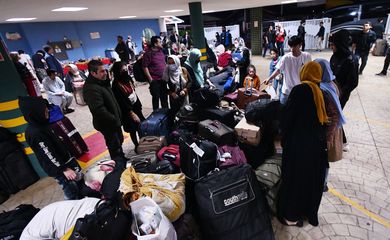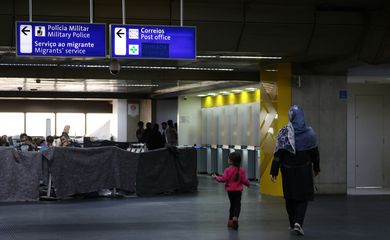New reception rules for Afghans in Brazil viewed with caution

Brazil’s Ministry of Justice and Public Security and the Ministry of Foreign Relations have decided to make the granting of temporary visas to Afghans conditional on vacancies in affiliated shelters. Experts and people working to receive refugees from the Asian country have expressed concern about the decision, made official on September 26.

In a statement released the same day, the ministries justified the change saying they seek to “promote the humanitarian reception of Afghan immigrants in a safe, orderly, and regular manner.”
“The new policy aims to ensure that, upon arriving in Brazil, Afghans receive a planned, organized, and dignified welcome, in order to better promote local integration and the dignity of the beneficiaries with security and preparation,” the note reads.
The only point of entry for Afghans into Brazil is Guarulhos Airport in São Paulo, which, according to municipal authorities, is where 48 Afghans were sheltering until the night of September 27, waiting to be accommodated. According to the local authorities, the 257 vacancies for migrants and refugees—207 of which managed by the city council, 50 by the state government—are taken.
With the new move, after being granted a visa, to be issued exclusively by the Brazilian embassies in Tehran, Iran, and Islamabad, Pakistan, refugees will have 180 days to land in Brazil. Previously, authorization was given at the embassies in Moscow, Russia; Ankara, Turkey; Doha, Qatar; and Abu Dhabi, United Arab Emirates.
Victor Del Vecchio, a lawyer with a master’s degree in International Law from the University of São Paulo, considers Brazil to be a good model of migratory legislation, as it takes into account a range of vulnerability criteria that ensure entry and residence in the country. However, he believes it will take even longer to issue humanitarian visas, as the number of embassies responsible for this task has been reduced.
According to Del Vecchio, “creating bureaucratic barriers to migratory flows won’t necessarily decrease them. Rather, it often aggravates vulnerability. In other words, people will end up finding ways to come irregularly. It might even increase corruption at the other end. Visas become scarcer, and you end up favoring families that have more access to professionals who work with these procedures, including the corruption of system operators,” he argued.
United Nations
Davide Torzilli, representative of the United Nations Refugee Agency (UNHCR) in Brazil, noted that having people of the same nationality for reception and maintaining their family units can prove fundamental for Afghans to stay in Brazil permanently.
The authorities, he said, must adapt the reception measures to the special needs of each nation. Vulnerable people, like refugees, are usually in no condition to organize themselves to flee and travel as planned. “It’s often a matter of life and death,” he declared.
In his opinion, the ordinance shows the government’s commitment to the issue. “Hence the importance of looking at the arrival of refugees with solidarity.”
In a note to Agência Brasil, the administration of Guarulhos Airport said the responsibility for welcoming Afghans lies with Guarulhos city officials, which maintain a humanized service post for this purpose and extend the service to other refugees.




